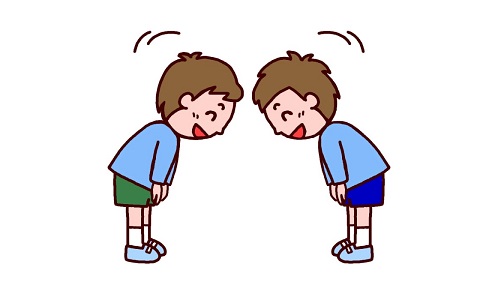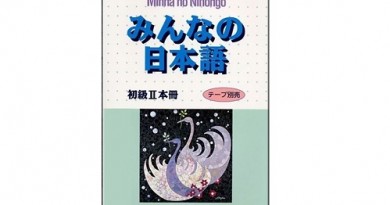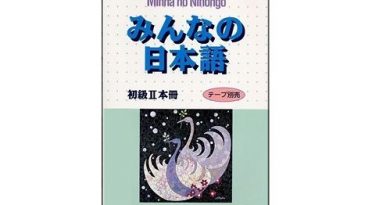Contents
Learn minna no nihongo lesson 24
6. Mondai
To do the “Mondai” section, you need “minna no nihongo” book and audios for listening
Exercise 1: Listen and answer questions
With this exercise, first you need to listen to the question and write down what you have listened and then answer the question according to your own understanding. You should not try to focus on clearly listening to each word of a sentence and miss the following sentences. You should listen it for the first time, answer the questions one by one, with the questions you can’t listen then listening to them the second time. After that, you can listen again and copy the words to improve your listening skill and remember words better. Finally, after listening and answering all questions, you can refer to the translation and the answer below.
Answer:
Translation :
1.子どものとき、お母さんは甘いお菓子をくれましたか。
Kodomo no toki, okaasan ha amai okashi wo kuremashita ka?
When you were a child, did your mother give you sweets?
2.あなたは今お母さんに何をしてあげたいですか。
Anata ha ima okaasan ni nani wo shite agetai desu ka.
What do you want to do for your mother now?
3.日本人の友達にあなたの国の料理を作ってあげたことがありますか。
Nihonjin no tomodachi ni anata no kuni no ryori wo tsukatte ageta koto ga arimasu ka.
Have you ever cooked your country food for a Japanese friend?
4.お金がないとき、だれに貸してもらいますか。
Okane ga nai toki, dare ni kashite moraimasuka.
When you don’t have money, who lend you money?
5.子どものとき、お父さんはよく遊んでくれましたか。
Kodomo no toki, otousan ha yoki sunde kuremashita ka.
When you were a child, did your father often play with you?
Answer:
1.いいえ、くれませんでした。
Iie, kuremasen deshita
No, I wasn’t given.
2.旅行に連れて行ってあげたいです。
Ryokou ni tsurete itte agetai desu.
I want to take my mother to travel.
3.いいえ、ありません。
Iie, arimasen.
No, I haven’t.
4.兄に貸してもらいます。
Ani ni kashite moraimasu
I was lent money by my elder brother.
5.はい、よく遊んでくれました。
Hai, yoku asonde kure mashita.
Yes, he often played with me.
Exercise 2: Listen and choose true or false
With this exercise, the listeners will listen to the conversation, then there will be a key point about the problem that will be raised in the conversation. The listeners must choose whether the content is true or false according to what they has listened. If it is true, select 〇 (maru) and if it is false, choose ✖ (batsu). In this listening section, you should pay attention to the concluding sentence to see whether that sentence is given in a positive or negative form in order to avoid being “tricked” when listening.
1.
女: いい 時計ですね。どこで 買いましたか。
That’s a good watch. Where did you buy it?
男: これですか。誕生日に 兄が くれました。
This one? My brother gave me on my birthday.
女: そうですか。
Is that so.
★ 男の 人は お兄さんの 誕生日に 時計を あげました。
★ The man gave his elder brother a watch on his birthday.
2.
女: あ、雨ですね。ミラーさん、傘を 持って いますか。
Oh, it’s raining. Mr Miller, do you have an umbrella?
男: いいえ。
No, I don’t.
女: じゃ、わたしのを 貸しましょうか。
Well, shall I lend you my umbrella?
男: ええ。でも、佐藤さんは どうしますか。
Yeah. What about you, Ms. Sato?
女: 姉が 車で 迎えに 来て くれますから、大丈夫です。
My elder sister will come to pick me up by car, so it’s alright.
★ 佐藤さんは 車で 帰ります。
★ Ms. Sato will go home by car.
3.
男: すみませんが、写真を 撮って ください。
Excuse me, please take a photo for me.
女: いいですよ。じゃ、撮りますよ。
OK. Well, I’m taking now.
男: どうも ありがとう ございました。
Thank you very much.
女: いいえ、どういたしまして。
You’re welcome.
★ 女の 人は 男の 人に 写真を撮って もらいました。
★ The woman was photographed by the man.
4.
男: すみません。この 近くに 郵便局が ありますか。
Excuse me. Is there a post office near here?
女: ええ、ありますよ。わたしも 近く まで 行きますから、いっしょに 行きましょう。
Yes, there is. I’m going too so let’s go together.
男: すみません。
Thank you.
★ 女の 人は 郵便局の 近くまで 男の 人と いっしょに 行って あげます。
The woman goes to the post office with the man.
5.
女: きのうは わたしの 誕生日でした。
Yesterday was my birthday.
男: そうですか。おめでとう ございます。パーティーを しましたか。
Is that so? Congratulations. Did you have a party?
女: いいえ、神戸へ 食事に 行きました。友達が 連れて 行って くれました。
No, I went to Kobe for a meal. My friends took me there.
★ 女の人は きのう 友達と 神戸へ 行きました。
The woman went to Kobe with her friends yesterday.
Answer:
1 (✖)
2(〇)
3(✖)
4(〇)
5(〇)
Exercise 3: Choose the correct answer
With this exercise, you need to carefully review the grammar you have learned and note the meaning of the sentence to clearly identify the recipient and the giver to choose the best answer.
Example: 太郎君は テレサちゃんに 花を (あげました、くれました)。
太郎君は テレサちゃんに 花を (あげました)。
Taro gave flowers to Teresa.
Explanation : Bothくれました and あげました express that someone someone does something for others. But we don’t useくれました here because くれました is used with the recipient who is my self or my family. So we will use あげました here.
Here are some exercises, after finishing, you can refer to the answers and translations below
The words : あります、借ります、わたります、でます
1.ワットさんは わたしに 英語の 辞書を (あげました、くれました)。
2.わたしはカリナさんに大学を 案内して(くれました、もらいました)。
3.休みの日夫はよく料理を作って(あげます、くれます)。
4.駅で友達に細かいお金を貸して(もらいました、くれました)。
Exercise 4: Choose true or false for the rewritten sentence
This is an exercise that helps you review grammar by summarizing the conversation through a sentence. However, the rewritten sentence may be true or false so you need to read the conversation carefully to find the meaning then compare it with the rewritten sentence. To be able to remember better, with the wrong rewritten sentence, you can rewrite that sentence according to the grammar you have learned and your understanding.
Example :
ミラー:すみません。塩を取ってください。
Miller : Excuse me. Please pass me the salt.
わたし:はい。どうぞ。
Me : Yes. Here you go
→わたしはミラーさんに塩を取ってあげました。
→ I got Mr. Miller to pass me the salt.
Answer: True
Here are some exercises, after finishing, you can refer to the answers and translations below
1.
グプタ:あ、細かいお金がない。
わたし:グプタさん。このテレホンカードを使ってください。
グプタ:すみません。
→わたしはグプタさんにテレホンカードを貸して あげました。
2.
男の人:重いでしょう?持ちましょうか。
わたし:ありがとうございます。
→男の 人は わたしの荷物を 持って くれました。
3.
(エレベーター)
ミラー:すみません。6階 お願いします。
わたし:はい。
→わたしは ミラーさんにエレベーターのボタンを押してもらいました。
Translation and Answer:
1.
Guputa : Oh, I don’t have fine money.
Me : Mr. Guputa. Please use this phone card.
Guputa : Thank you.
→ I lent Guputa phone card.
Answer : True
2.
The man : Is it heavy? Shall I carry it for you?
Me : Thank you.
→ The man carried the luggage for me.
Answer : True
3.
(In the elevator)
Miller : Excuse me. 6th floor, please.
Me : Yes.
→ I asked Mr. Miller to press the elevator button.
Answer : False
Rewrite : わたしはミラーさんにエレベーターの ボタンを 押して あげました。
I pressed the elevator button for Mr. Miller.
Exercise 5: Choose the best particle
With this exercise, you need to review the grammar structures you have learned, identify the main subject of the sentence and check what type of the words standing before and after the particle to choose the correct particle.
Example :
わたしは ミラーさん( に )チョコレートを あげました。
I gave Mr. Miller chocolate.
Applying the grammars you have learned: N1 は N2 に ~ をVてあげます
Explanation : In this sentence, the recipient is Mr. Miller so the particle will be に
Here are some exercises, after finishing, you can refer to the answers and translations below
1. 父は誕生日に時計(____)くれました。
2.だれ(____)引っ越しを 手伝って くれましたか。
……カリナさん(____)手伝ってくれます。
3. わたしは山田さん(____)駅まで 送って もらいました。
4. わたしは彼 (____)旅行の本を送ってあげました。
Above is instruction to Learn minna no nihongo lesson 24. See other lessons in category : learn Japanese with minna no nihongo or: Japanese for beginers.


